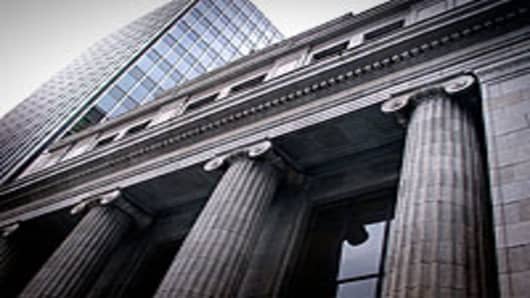Fears of a new global banking crisis moved to the foreground Wednesday and are driving investors out of stocks and into safe-haven Treasurys, gold and Swiss francs.
The catalyst was an idea that's been circling markets for several weeks—that France is next in line to lose its triple-A credit rating now that the U.S. has been downgraded.
Even though the threemajor rating agencies affirmed France's ratingthis week, the speculation still took a toll on the French banking sector, hurt by rumors of collateral funding issues.
Societe Generale, at the heart of the market talk, denied rumors that it is having problems and reaffirmed that it has low exposure to the weaker eurozone countries. But its shares remained under pressure, as did global bank stocks. German and French stock markets closed down 5 percent.
After European markets closed, Societe Generale CEO Frederic Oudea appeared on CNBC and said the rumors about the bank were "rubbish." He said Societe Generale will be able to meet new global capital standards and that the situation in France is under control.
Analysts are quick to point out that U.S. banks have become much better capitalized than they were during the financial crisis of 2008.
In the U.S., shares of major banks moved sharply lower. Bank of Americaheldan investor conference call Wednesday afternoon to try and reassure nervous investors that it doesn't need more capital. But the market didn't seem impressed.
Meanwhile, JPMorgan Chase CEO Jamie Dimon told CNBC Wednesday that he is comfortable with the bank's exposure in Europe.
"We've been in Europe for hundreds of years," he said. "We have manageable exposures to all the banks. We're not going to cut and run."
Bank stocks, which had recovered some of their steep losses in the afternoon, sold off sharply in another wild ride lower into the closing bell. The S&P financial sector was down 7.1 percent Wednesday, and is now down 9.5 percent for the week and more than 23 percent year-to-date.
Banks were the worst performers in the stock market, which also closed with steep losses. The Dow was down 519 points at 10,719, its second more than 500-point loss in three days. The S&P 500 was down 51 at 1120.
Bank of America, Goldman Sachs,Citigroup and Morgan Stanleywere all down about 10 percent. J.P. Morgan was down 5.6 percent and Wells Fargowas down 7.7 percent.
Fed Chairman Ben Bernanke was expected to meet with President Obama and Treasury Secretary Tim Geithner to discuss the economy at the White House Wednesday.
Europe's sovereign debt crisis, which has moved from country to country, has been seen as the potential spark for a European banking crisis but European officials have bailed out Ireland, Portugal and Greece and are working to trying to stem the contagion from spreading to bigger countries.
Standard and Poor's, which cut the U.S. credit rating last week, said Wednesday that the French sovereign rating is not at risk, and that the French government has been more serious than the United States in addressing fiscal issues.
In France, French president Nicolas Sarkozy ordered finance and budget ministers to develop a new deficit reduction program.
The European Central Bank this week was able to slow the spiral of speculation surrounding Italy and Spain by stepping in to buy the debt of those countries. Credit default swaps, which are like an insurance against bond default, rose sharply on Italy, France and Spain Wednesday.
"Everybody in the world is saying it's not real, but to me it's got to be real...We know what the French banks' exposure is just to Greece alone," said one trader.
Rochdale banking analyst Richard Bove said there is little chance of a French bank default.
"If a bank in Europe went under, it would cause huge counterparty risk. It wouldn't be that bad for 99 percent of the banks in the country. It would be bad for the biggest banks...Why are all the banks falling in price? The deeper issue is what the Federal Reserve did yesterday," said Bove.
The Fed , in an unusual move Tuesday, revealed that its "extended period" to hold rates at zero runs until the middle of 2013. The Fed also downgraded its view of the economy to a picture of slow growth.
"The Federal Reserve told me, number one, that the economy is weakening and my loan losses just went up," Bove said. "The ability to make new loans is hampered by the weaker economy, and on top of that, the Federal Reserve said they were going to keep margins on my product down," he said, explaining banks need higher rates to make profits on lending and deposits.
"...FDIC insurance on deposits in many cases may be higher than the yield the bank gets on deposits," he said.
"The low rate structure 'helicopter Ben' (Bernanke) put in for us helps out a lot of companies but doesn't help the banks," said Fred Cannon, KBW chief equity strategist on "Fast Money" Wednesday.
Questions? Comments? Email us at marketinsider@cnbc.com



